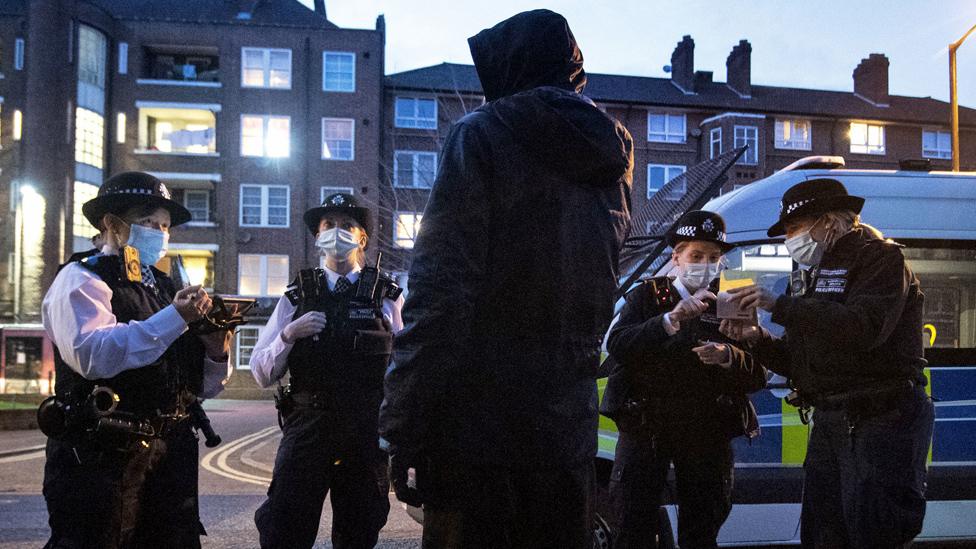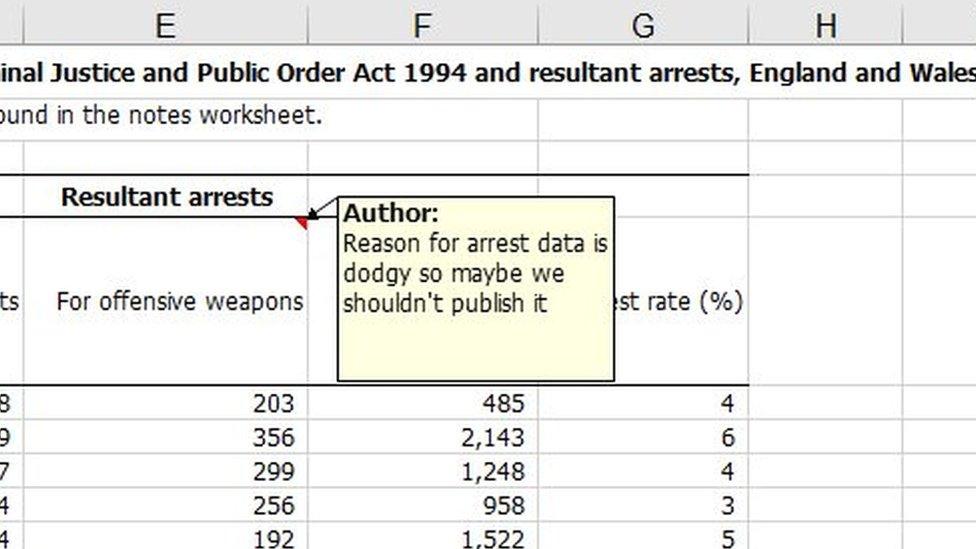Official stop and search figures published with 'dodgy' warning
- Published

The Home Office has released one of its most politically sensitive data sets with a note attached describing some of the figures as "dodgy".
The note, spotted by BBC Verify, was on a Home Office spreadsheet, external about the number of people arrested after being stopped and searched by police.
It said: "Reason for arrest data is dodgy so maybe we shouldn't publish it."
The note was removed after we contacted the Home Office.
The data was about the number of people stopped and searched in England and Wales under Section 60. This means that police do not need to have reasonable suspicion to carry out a search.
The orders give the police powers to stop people within a designated area, such as the Notting Hill Carnival.
The arrests were broken down into those "for offensive weapons" or those "for other reasons".
Attached to the offensive weapons column was the note from an "author" asking whether the figures should be published.

The official data said that in the year ending 31 March 2023 there had been 4,280 searches under Section 60, with 43 people found to be carrying offensive weapons.
As a result, there had been 52 arrests for carrying offensive weapons.
We don't know why there were more arrests than people found to be carrying offensive weapons. This has not been the case in previous years, according to the available data.
We asked the Home Office whether this was the reason the note's author thought the data was 'dodgy' and how long the data had been considered 'dodgy'.
It did not respond to these questions and referred to another note accompanying the data, external which said:
"Data quality checks showed that some forces will by default provide the same reason for arrest as for reason for search or they record all reasons for arrest as other. For the first time this data has been presented in the summary tables as experimental statistics to denote that there are known data quality issues."
Difficulties with data
The Home Office says it has been collecting the "reason for arrest" data to understand how effectively the police are using stop-and-search powers.
But Dr Simon Harding, director of the National Centre for Gang Research, says different forces have different ways and procedures for recording their data.
"There is data coming in from 43 different constabularies and there are varying levels of quality," he said. "These things ought to be ironed out before they get to the Home Office."
We showed the note to Habib Kadiri, director of StopWatch, a campaign group which focuses on police stop and search and the "overpolicing of marginalised communities".
He said: "The comment in question is indicative of a long history of questionable recording practices by police forces."
Mr Kadiri said police forces should be forced by law to provide comparable data, adding: "We have received anecdotal evidence in the past to suggest that searches are not recorded properly or at all, in ways that indicate the issue of data quality may be more than simply a technical matter."
Labour MP Dame Diana Johnson, who chairs Parliament's Home Affairs Select Committee, told us: "This highlights the difficulties in getting standardised data and it does worry me because the Home Office has got into bother before with its stats and data. You would think they'd want to be careful to check and double-check all of this before it goes out."
The Office for Statistics Regulation said it recognised the Home Office "could be clearer" that the data was experimental, but that it was "common practice" to publish newly-introduced breakdowns with official statistics.

